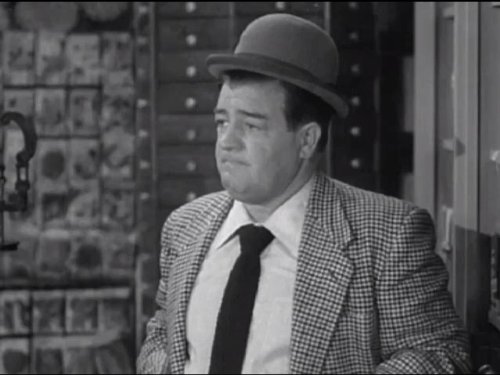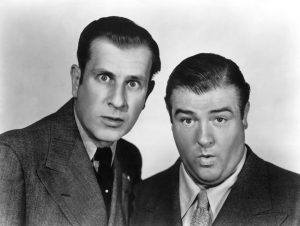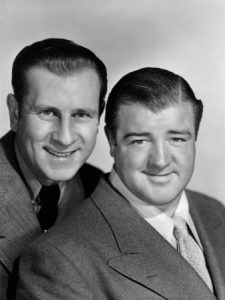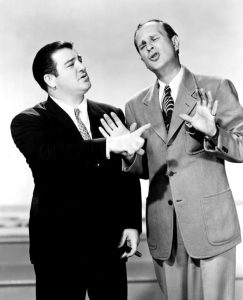(originally published in Journal of Living, January 1954)
Lou Costello: My Cure For Sorrow, As told to Vivian Cosby
A funny man’s prescription for grief that can work for everyone as it has for him.
“Why did this have to happen to me?”
A few years ago, when I was stricken with rheumatic fever, this question kept repeating itself in my mind. As I lay in bed week after week, I searched for the answer. And what made it all the more bewildering was that I had become ill while making a tour to raise charity funds. While striving to help others, I had been stricken myself. Why? The more I thought about it, the more sorry I became for myself.
I thought about the seven years of hard struggle Bud Abbott and I had gone through before achieving success. Now I wondered if I would ever perform again. All in all I was crying plenty – for a guy named Lou Costello.
Then one morning my wife Ann, as usual, brought in my breakfast tray along with the morning paper. On this particular morning the paper was folded to a story about a little girl named Goldie. It seemed that the doctors has given this child only six months to live. I read the story through and was aroused by it. Here was a child doomed to die, even before she has started to live. It bothered me. Goldie was on my mind the rest of the day. Finally I telephoned my doctor to ask him to look into the case. His findings resulted in my sending the little girl to the Mayo Clinic, and eventually she was cured.
During that time someone thanked me for helping Goldie. I said in reply. “I am very grateful that I had the money to do it.” It was in that word “grateful” that I found one prescription for sorrow: Count your blessings. I began to count mine and assure you they outnumbered my misfortunes, although I have certainly had my share of the latter.
Among my many blessings was my baby son, Lou Jr. He was still at the age where he crawled about, and before I started to walk again. I wiggled along the floor beside him. In fact we learned to take our first steps together. No father and son could have been closer. Being with him, and adjusting myself to the fact that there were other people worse off than I, made the time pass quickly. Soon I was walking and ready to resume my radio show.
TRAGEDY IN THE SWIMMING POOL
The afternoon I went to final rehearsal, Ann gave me a present from Lou Jr. It was a gold identification bracelet. I put it on my wrist and it has never been off since that time. Kissing Ann goodbye, I said. “Have Lou listen to the broadcast and see if he recognizes my voice.” Then I left my home feeling that I was mighty lucky man.
At the broadcasting station, Bud and I were in the midst of rehearsing a comedy routine when I was called to the telephone. Even now, thinking back to those moments at the telephone, I find it hard to keep back the tears, for I was told that my baby son was dead. He had fallen into the swimming pool and drowned.
THE RETURN OF HAPPINESS
I left the rehearsal in a daze and drove home. All the time I was thinking, “It’s impossible.” Only two hours ago the boy and I had been romping on the floor together. Now they said he was dead. I told myself, “It can’t be true. There is some mistake.” But when I arrived home, Ann in tears told me what had happened. I knew then that it was all too true – our son was dead.
After comforting my wife the best I could, I went back to the broadcasting station to do my radio show that night. Not because I was following the tradition of show business that “the show must go on.” No, indeed. I wanted to do the radio show so that my voice would go out into the air, with the hope that Lou, Jr., might hear it wherever he was.
Again I asked myself, “Why did this have to happen to me?” This time I confess I found it difficult to keep my thoughts upon counting my blessings. The baby was constantly on my mind. Every little boy that I saw reminded me of the many things I had planned to do for my son. There was sadness in my heart. How I managed to be funny man in pictures and on the radio, I will never know.
Then gradually, as the time passed, I began to realize that though I had been deprived of doing things for Lou, Jr., there still were a lot of children in the world I could help. So Bud Abbott and I created the Lou Costello, Jr., Youth Foundation, for underprivileged children. Its facilities include libraries, medical clinics, gymnasiums and playgrounds.
Each and every child meant something to us. At Christmas time we didn’t just bring a lot of toys to the Foundation. Instead, weeks before the holidays, we visited each child and asked him what he or she wanted for Christmas. Whatever they requested, within reason, was there for them under the tree on Christmas.
Here again I learned another prescription for sorrow. By giving myself to these underprivileged children, I found happiness again.
A CHURCH IS BUILT
I first learned about really helping other human beings from a priest at Saint Anthony’s church in my home town, Paterson, New Jersey. The small wooden church over which he presided has been condemned and a new church was badly needed. The priest came to me with his problem. I assured him that I would gladly make a donation toward a new church. But, the priest shook his head and said, “I’m sure you and your friends would be glad to build a new church and I appreciate it. But that’s not really the way to help. You see, Lou, the whole congregation want to have a hand in erecting a new church. If it’s just given to them, they’ll never feel that they did their share of work to make it possible.”
This line of reasoning rather puzzled me, so I asked, “If you don’t want money, what can I do to help?”
With a smile the priest replied, “You can put on a benefit to raise money. The people of the church will sell tickets. In this way, Lou, you will be helping people to help themselves.”
So I did it the priest’s way. With the assistance of several friends, I put on a show; and the wooden church was replaced by a nice brick one.
THE LESSON OF THE CRIPPLED BOY
For many years me mother had been interested in a crippled boy in a hospital in Paterson. He was an orphan, who was in need of encouragement and love. Mother supplied these things, and as our finances improved we were able to call in specialists to help him.
Being busy in Hollywood making pictures, I did not see the boy for several years. Then when I made a trip back East, my mother took me to see him. He was now a young man in his teens. As another surprise, he came running to greet me.
Believe me I was so happy I wanted to do anything in the world I could do to help him. So I asked him what he wanted. I would have bought him a new car, a house, in fact almost anything! But all he asked for was a suit with a pair of long pants. The thing that would give him joy was as simple as that.
But remembering what the priest said about helping people help themselves, I bought him a newsstand as a means of earning a living. To my dismay, when I told him about it he became upset. He was grateful, but he hoped I would not mind if he refused. Naturally I was a bit taken aback and maybe a little hurt. So the boy explained: “Lou, I want to stand on my own two feet, so I’ve taken a job running the elevator here in the hospital. After all, this hospital is the only home I’ve known. I’d like to stay here.”
Today, he is a doctor in that very hospital which he considered his home. And I will always remember his courage in rejecting my offer.
BITTERNESS – OR UNDERSTANDING?
I personally think that out of the misfortunes and sorrows which come to people two things can happen. The people can become bitter, thus ruining their lives, or they can gain an understanding of, and compassion for, other human beings.
An example of this happened on the Universal Studio lot where there was a lame gateman. I wondered who no one has ever offered to do something about his crooked leg. Inquiring about this, I learned that several had offered him medical care. He had always thanked them but refused.
This did not make sense to me. No one wants to go through life a cripple, if there is any possibility of being cured. Behind his rejection, there must be a reason.
Whenever I could I talked with this man, being careful never to show that I felt sorry for him. During our conversations, I discovered that he was the sole support of a large family. Therefore he could not afford to be away from his job even for a few days. This explained why he had refused offers of an operation. SO now it was easy to arrange for him to go to the hospital, secure in the knowledge that his family would still receive his salary. Had I not been through misfortune myself, I would have been incapable of the understanding that was needed to help this man. I am very grateful for this, as I am thankful that I was given the talent to make people laugh. Whenever I play in a picture or on television, I think that maybe someone whose heart is filled with sorrow will see me. If even for a few moments I can make people forget their troubles, I feel that my life is worthwhile.



